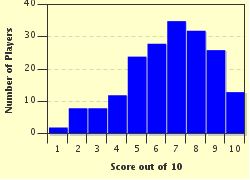Quiz Answer Key and Fun Facts
1. In some quarters Benedict Arnold is considered to have committed treason against his country. The case in point was a military installation that he allegedly tried to turned over to the British in 1780. Do you know the name of that fortification?
2. Julius Caesar was stabbed to death at the Roman Forum. His last words were "Et tu, Brute?"
3. Who was the disciple who betrayed Jesus for thirty pieces of silver?
4. In 1953 in the USA a man and his wife were found guilty of conspiracy to commit espionage in time of war and were both executed. What was their last name?
5. What was the name of the French politician who was selected as "Time Magazine Man of the Year" in 1931 but was executed for treason in 1946?
6. What was the name of the US military installation that abolitionist John Brown on October 16, 1859 attacked with a ragtag group of armed men?
7. Who was the leader of the National Socialist German Workers' Party that interrupted a political speech on November 8, 1923 at a beer hall in Munich hoping to create a revolution?
8. One traitor is now in the dictionary with the following definition: "A traitor who serves as the puppet of the enemy occupying his or her country." Which traitor received his dubious honor?
9. William Joyce was born in Brooklyn and later studied and lived in Ireland and England where he joined Fascist groups. When the UK cracked down on dangerous right wing forces, Joyce and his wife emigrated to Germany. There he found a career in broadcasting by beaming propaganda messages to the UK during World War Two. By what name did the British call him?
10. Who was the American military man who carried on spying activities for the Soviets for twenty five years?
Source: Author
Rehaberpro
This quiz was reviewed by FunTrivia editor
bloomsby before going online.
Any errors found in FunTrivia content are routinely corrected through our feedback system.


